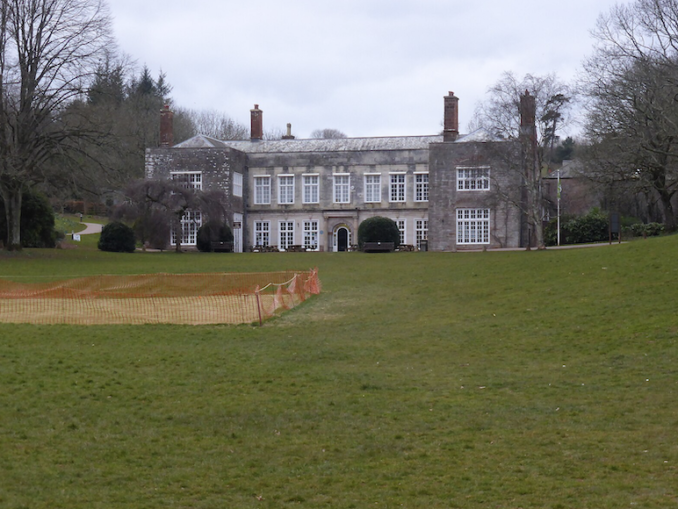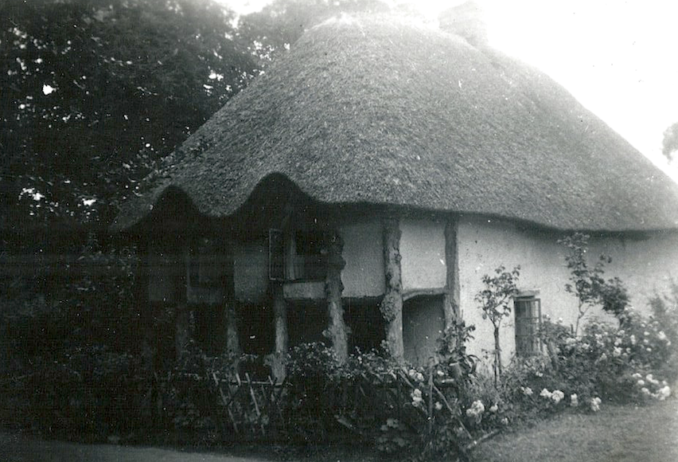Cockington
Cockington is a picturesque village located near Torquay, in the Torbay district of Devon. The village is renowned for its old cottages and serene landscapes. Cockington Court Country Park, a prominent attraction in the area, adds to the village’s charm. Spread across 460 acres, the park is part of the historic Cockington Estate and is known for its lush landscapes, water meadows and woodland areas, offering a haven for nature enthusiasts.
The centrepiece of the park is Cockington Court itself, a manor house dating back to the 16th century. This grand old building is not only architecturally beautiful but is also home to over 20 craft studios where visitors can watch artisans at work.
Visitors, including my grandparents in the late 1940s, can stroll through the beautiful Ornamental Lakes, Rose Garden, and the Walled Art Garden, each offering a unique blend of flora and fauna. The park also has a variety of walking trails, including the popular Cockington Walk, which provides visitors with stunning views of the surrounding countryside. The park is also home to the Green Heart Project, an innovative environmental conservation initiative dedicated to preserving and enhancing Cockington’s natural beauty and wildlife habitats.

Cockington Court,
Paul Farmer – Licence CC BY-SA 2.0
Facilities at the park include a visitor centre, the Cockington Tea Rooms for a spot of traditional English tea, public restrooms, and a children’s play area. Regular events and workshops are held at the park, ranging from craft fairs to historical reenactments, making it a vibrant community hub as well as a tourist attraction.
In summary, Cockington Court Country Park is a gem in Devon’s crown, offering visitors an opportunity to immerse themselves in the tranquillity of the English countryside while experiencing rich history and vibrant local culture.
The manor house in Cockington, known as Cockington Court, has been the centrepiece of the village for centuries. It was initially a medieval manor, built in 1070. It changed hands several times over the centuries. The Cockingtons owned the manor from 1130 to 1351. Between 1371 and 1654 it was owned by the Cary family, who were prominent figures in the local and national political scene. They made considerable alterations to the house, transforming it into an Elizabethan manor.
The village’s history can be traced via the Domesday Book of 1086, where it was recorded as ‘Cockintone’, and as a place of significant value. The village was owned by William de Falesia, a Norman nobleman, who was granted the land by William the Conqueror. Nowadays the village itself is known for its charming thatched cottages, most of which were built in the 16th and 17th centuries. The Cockington Forge, a blacksmith’s shop dating from the 14th century, is one of the oldest buildings in the village.
In the 18th century, the Mallock family, wealthy ship owners and traders bought the estate and made further changes to the manor house, giving it the Georgian appearance it has today. The family owned the estate until the 1930s, when it was sold to the Torquay Corporation. It has been owned by the local authority ever since and is now managed as a country park.
Cockington has managed to preserve its historical charm through careful conservation and management. Today, it provides a window into the past, giving visitors an opportunity to experience a piece of England’s villainous rich history.
In the modern day, a variety of accommodations are available to suit different preferences, including self-catering accommodations, B&Bs and guest houses, camping and touring sites, hotels, pubs and inns, and more. Visitors can also opt for special breaks like dog-friendly holidays, spa breaks, romantic breaks, and boutique accommodations. With its rich history and natural beauty, this charming village provides a quintessential and sometimes eccentric English countryside experience.
In 2021, Patrick, a four-year-old Shetland pony, was elected unopposed to be mayor. Initially, he would meet his constituents at the local pub, The Drum Inn. Unfortunately, he fell foul of his council who insisted his interaction pen needed planning permission. Not the only odd going on in this ostensibly idyllic arcadia. Read on.
Higher Lodge
A couple of minutes walk from The Drum and guarding the driveaway to Cockington Court manor house sits Higher Lodge, pictured below by my grandparents during their 1947 road trip holiday to the West Country.

© Always Worth Saying 2023, Going Postal
According to an estate agent, this chocolate box cottage ornee, built of plastered stone rubble and with whole tree trunks supporting the upper floor beneath a thatched roof, dates from 1410 and is known as one of the prettiest cottages in Cockington. As well as the surrounding Cockington Court park, the cottage enjoys its own pretty and well-kept gardens.
In June 1991 it was up for sale with an asking price of £150,000. The estate agent’s guff announced that stepping inside the old oak front door revealed a well-modernised cottage complete with gas central heating and a good sized pine fitted kitchen/diner that included a hob, grill oven, fridge and arched glass door to a utility and laundry room (with plumbing, a washing machine and tall broom cupboard). Original exposed beams remained in all three bedrooms, two of which enjoyed delightful Tudor-style leaded light windows.
The controversial garden was adorned with lawns and a fish pond. Controversially well-stocked borders flourished alongside trees that included apple, flowering cherry and a mature elm. Space also allowed for a summerhouse and two sheds. At the rear of the cottage, steps lead to a further lawned area with rose borders and a copper beach hedge with direct access to the park. The gardens attract a variety of bird and animal life and, one is obliged to add in a frankness oft missing from estate agent’s guff, the criminal classes.
Daily Mail reading Puffins will need to know the property was listed for sale again in 2014 for a post-credit crunch house price crash £195,000 and eventually sold in 2016 for a mighty £326,000. Having been sold again for £380,000 in February 2021, it is currently a £200+ per night AirBnB hosted by Ceri, who lives in London and whose hobbies are travel, good food and new experiences. You can have a look around the property here.
Ceri’s reviewers gush that the house is, ‘Wonderfully situated – just outside Torquay. It’s a 20-minute walk to the coast and a short drive away from lots of activities (zoo, steam railway, miniature village). Very much a chocolate box cottage! We really enjoyed the amenities too – the record player, hot tub and gas fire were great.’
Despite describing her working life as ‘hosting lovely guests’, Miss Cheri hosts as an individual rather than a business with the small print suggesting therefore ‘consumer protection laws don’t apply.’
Hmm.
As for those controversial gardens and borders, on Friday November 14th 1952, half a decade after my grandparents unknowingly photographed the crime scene, the Torquay Times reported a Mr George Williams of Higher Lodge, Cockington, to be before the local magistrates.
Mr Williams admitted to the theft of three begonia plants worth 6s (30p) from Corporation property. The 55-year-old was a labourer-gardener employed by Torquay Council, presumably at Cockington Court Park. In mitigation, Mr Willams’ representative, a Mr H.P. James, explained to the court that since Higher Lodge was also a Council property, rather than being stolen, the 30 pence worth of begonias had been ‘relocated’ from one Corporation garden to another. Ahhh.
Not quite a high deed or misdemeanour, Mr Williams was conditionally discharged for six months, ordered to pay 4s (20p) costs and left the employ of Torquay Corporation to become a bus conductor.
But the matter did not rest there. Be it karma or a further injustice to Mr Williams, more than a decade later on March 6th 1965, the Herald Express reported that Mr Williams was embroiled in yet another crime – as if a resident of Cabot Cove or Midsomer – this time as a victim.
A Mr Jack Cloke of no stated address was committed to Devon Quarter Sessions accused of theft from a number of addresses within the Torquay area. Between September 7th and 9th, he was accused of breaking and entering Higher Lodge, Cockington, the house of Mr George Williams, and stealing £100. Puffins with suspicious minds assuming ha’pennies and truppeny bits may have been ‘relocated’ from a Torquay Corporation clippy’s bag, may rest easy as the Herald reported the cash to be in notes and silver.
Mr Cloke (40) was also charged with stealing £20 from a Mrs Hilda Ould of Grafton Terrace, Torquay, with Mr N B Jennings, prosecuting, adding that a further 100 offences were to be dealt with.
Detective Constable B. G. Martin read out to the court a statement made by Mr Cloke. Not quite Michael Mansfield KC or George Carmen QC, Mr Cloke claimed he couldn’t be guilty of breaking and entering as all the properties he’d stolen from had unlocked doors or keys that were conveniently hidden under mats or hanging on nearby nails.

© Google Street View 2023, Google.com
In the modern day, the cottage is viewable via Street View but from the public road rather than the avenue that leads to the manor. You can have a look around here.
The estate agent, another villain, forgot to mention the large public car park very close to the rear of the cottage. This is presumably where my grandparents parked (and securely locked) their car before hurrying to the manor house while tightly clutching handbags and wallets to their persons, as if on a day trip to 1930s Chicago.
© Always Worth Saying 2023


